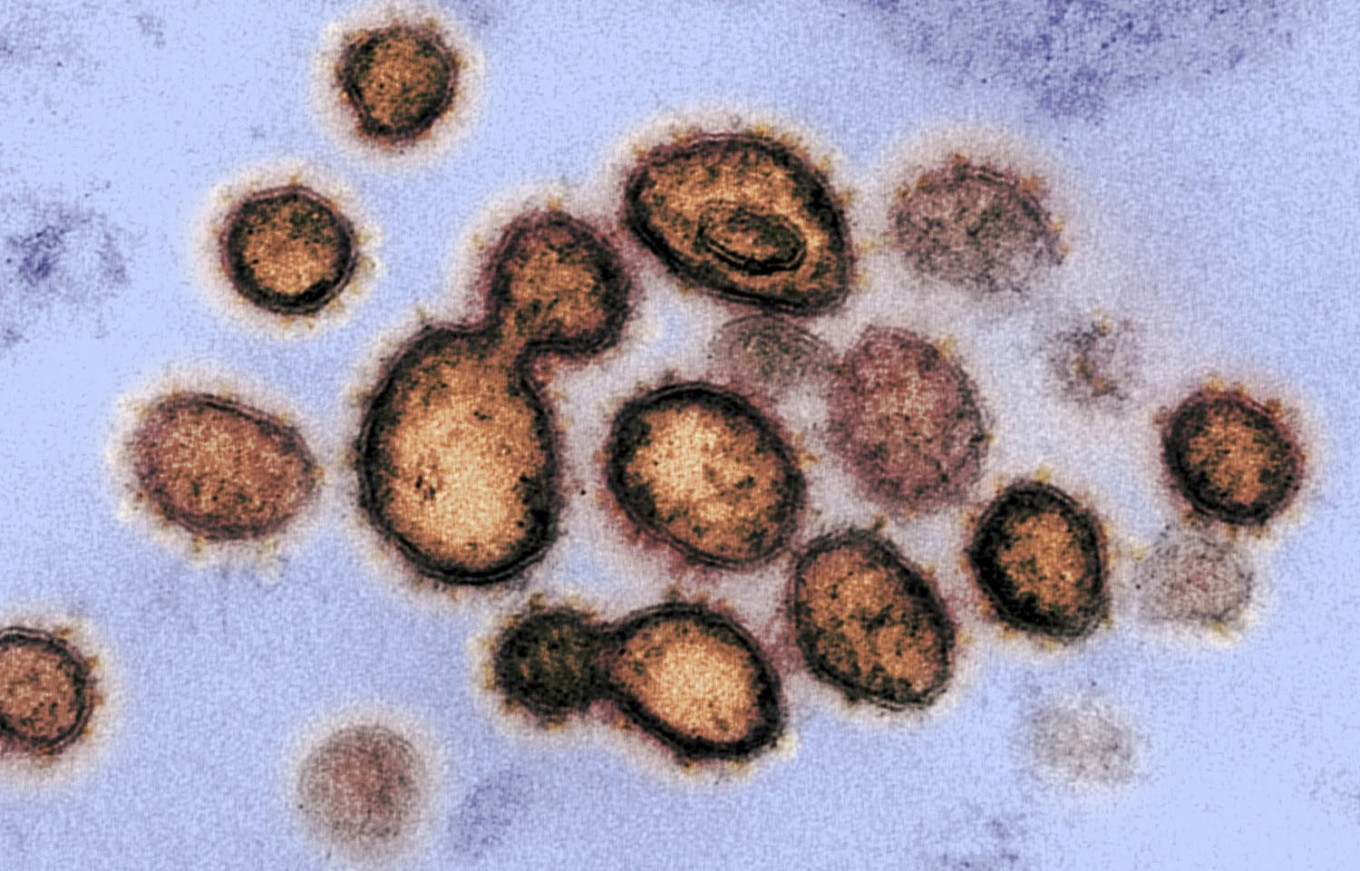Popular Reads
Top Results
Can't find what you're looking for?
View all search resultsPopular Reads
Top Results
Can't find what you're looking for?
View all search resultsResearchers eye tech wearables as virus early warning system
Can your Fitbit or Apple Watch detect a coronavirus infection before the onset of symptoms? Researchers are increasingly looking at these devices and other such wearables as a possible early warning system for the deadly virus.
Change text size
Gift Premium Articles
to Anyone
 This handout illustration image obtained February 27, 2020 courtesy of the National Institutes of Health taken with a transmission electron microscope shows SARS-CoV-2, the virus that causes COVID-19, isolated from a patient in the US, as Virus particles are shown emerging from the surface of cells cultured in the lab - the spikes on the outer edge of the virus particles give coronaviruses their name, crown-like. Researchers are increasingly looking at wearable devices as a possible early warning system for the deadly virus. (AFP/Handout / National Institutes of Health)
This handout illustration image obtained February 27, 2020 courtesy of the National Institutes of Health taken with a transmission electron microscope shows SARS-CoV-2, the virus that causes COVID-19, isolated from a patient in the US, as Virus particles are shown emerging from the surface of cells cultured in the lab - the spikes on the outer edge of the virus particles give coronaviruses their name, crown-like. Researchers are increasingly looking at wearable devices as a possible early warning system for the deadly virus. (AFP/Handout / National Institutes of Health)
Can your Fitbit or Apple Watch detect a coronavirus infection before the onset of symptoms?
Researchers are increasingly looking at these devices and other such wearables as a possible early warning system for the deadly virus.
Last month, scientists at the West Virginia University Rockefeller Neuroscience Institute said they had created a digital platform that can detect COVID-19 symptoms up to three days before they show up using the Oura ring, a wearable fitness and activity tracker.
An app developed by the researchers uses artificial intelligence to forecast the onset of COVID-19 related symptoms such as fever, coughing, breathing difficulties and fatigue, with over 90 percent accuracy, according to the university.
The researchers said the system could offer clues of infection in people not yet showing symptoms -- helping address one of the problems in detection and containment of the deadly outbreak.
Separately, Scripps Research Institute has enrolled more than 30,000 people -- and aims for much more -- in a similar study aiming to use wearables to find "presymptomatic" and asymptomatic people with COVID-19.
Scripps researchers had already previously demonstrated the value of wearables in predicting influenza in a study published in January in the British journal The Lancet.
Early indications suggest the devices "have the potential to identify people who are presymptomatic but still infectious," said Jennifer Radin, a Scripps epidemiologist leading the research.
Volunteers being sought
Radin told an online conference discussing the research that wearables are detecting "subtle changes that indicate you are coming down with a viral illness" before the onset of symptoms.
Scripps researchers say they hope to show that wearables data may be more reliable than temperature checks.
"Forty percent of people who come down with COVID don't have a fever," Radin said. "This is something that can be used to screen people that's better than a temperature check."
Resting heart rate, for example, is a good indicator because it is normally consistent before an infection, and can be accurately measured by most wearables.
"We see these changes [in heart rate] four days before someone starts to develop a fever," Radin said.
Eric Topol, director of the Scripps institute, said the idea of using wearables is promising because "over 100 million Americans have a smart watch or fitness band" which can provide key data for researchers, but that getting good results "is contingent on getting large numbers" to opt into the studies.
California health tech startup Evidation meanwhile has begun a project to produce an early warning algorithm from wearables worn by 300 people at high risk of contracting coronavirus, with funding from the US government and the Bill & Melinda Gates Foundation.
Luca Foschini, Evidation's co-founder and chief data scientist, said the research aims "to more effectively identify when and where people may contract COVID-19, and can potentially enable real-time interventions to limit spread and monitor outcomes."
A similar research effort is underway in Germany.
From recreation to medicine
The latest research highlights how some wearable devices -- developed initially for fitness and recreation uses -- may be adapted for important medical research.
Apple has begun studies on how its smartwatch can detect heart problems. And Fitbit has been working with some 500 different projects for research on cancer, diabetes, respiratory and other health issues.
Scientists say wearables can provide data on body temperature, heart and respiratory rates, sleep and activity patterns and other indicators which can be used as diagnostic tools.
Researchers from Stanford University announced plans in April to participate in research on wearables, in collaboration with Scripps, for COVID-19 and other diseases.
"Smartwatches and other wearables make many, many measurements per day -- at least 250,000, which is what makes them such powerful monitoring devices," said Michael Snyder, chair of genetics at Stanford School of Medicine.
Snyder said these devices may alert users when their heart rate, skin temperature or some other part of their physiology signals of infection or another ailment.
"You might wonder, 'Are these sniffles allergies, or am I getting sick?' These algorithms could help people determine if they should stay home in case their body is fighting off an infection," Snyder said.










